Related Research Articles
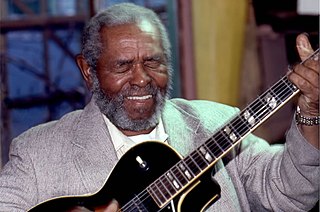
Walter Brown "Brownie" McGhee was an American folk and Piedmont blues singer and guitarist, best known for his collaboration with the harmonica player Sonny Terry.

Anthology of American Folk Music is a three-album compilation, released in 1952 by Folkways Records, of eighty-four recordings of American folk, blues and country music made and issued from 1926 to 1933 by a variety of performers. The album was compiled from experimental film maker Harry Smith's own personal collection of 78 rpm records.
Ella Jenkins is an American folk singer and actress. Dubbed "The First Lady of the Children's Folk Song" by the Wisconsin State Journal, she has been a leading performer of children's music for over fifty years. Her album, Multicultural Children's Songs (1995), has long been the most popular Smithsonian Folkways release. She has appeared on numerous children's television programs and in 2004, she received a Grammy Lifetime Achievement Award.
Joseph Spence was a Bahamian guitarist and singer. He is well known for his vocalizations and humming while playing the guitar. Several American musicians, including Taj Mahal, the Grateful Dead, Ry Cooder, Catfish Keith, Woody Mann, and Olu Dara, as well as the British guitarist John Renbourn, were influenced by and have recorded variations of his arrangements of gospel and Bahamian songs.
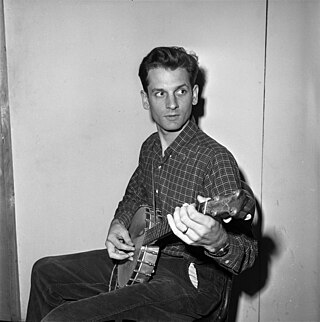
Mike Seeger was an American folk musician and folklorist. He was a distinctive singer and an accomplished musician who played autoharp, banjo, fiddle, dulcimer, guitar, mouth harp, mandolin, dobro, jaw harp, and pan pipes. Seeger, a half-brother of Pete Seeger, produced more than 30 documentary recordings, and performed in more than 40 other recordings. He desired to make known the caretakers of culture that inspired and taught him.
John Cohen was an American musician, photographer and film maker who performed and documented the traditional music of the rural South and played a major role in the American folk music revival. In the 1950s and 60s, Cohen was a founding member of the New Lost City Ramblers, a New York–based string band. Cohen made several expeditions to Peru to film and record the traditional culture of the Q'ero, an indigenous people. Cohen was also a professor of visual arts at SUNY Purchase College for 25 years.

Bascom Lamar Lunsford was a folklorist, performer of traditional Appalachian music, and lawyer from western North Carolina. He was often known by the nickname "Minstrel of the Appalachians."
Alice Gerrard is an American bluegrass singer, banjoist, fiddler, and guitar player. She performed as part of a duo with Hazel Dickens, and as part of The Strange Creek Singers and The Back Creek Buddies.
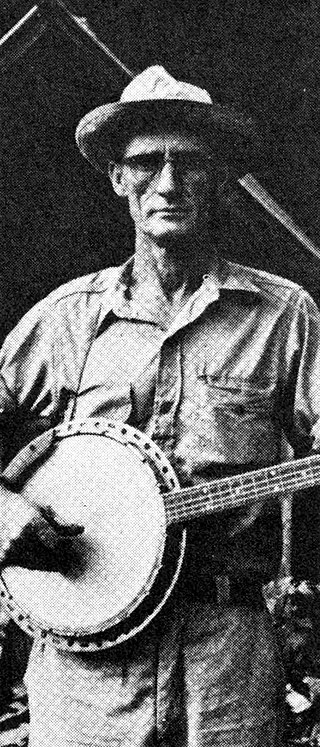
Roscoe Holcomb, was an American singer, banjo player, and guitarist from Daisy, Kentucky. A prominent figure in Appalachian folk music, Holcomb was the inspiration for the term "high, lonesome sound," coined by folklorist and friend John Cohen. The "high lonesome sound" term is now used to describe bluegrass singing, although Holcomb was not, strictly speaking, a bluegrass performer.
Hobart Smith was an American old-time musician. He was most notable for his appearance with his sister Texas Gladden on a series of Library of Congress recordings in the 1940s and his later appearances at various festivals during the folk music revival of the 1960s. Smith is often remembered for his virtuosic performances on the banjo, and had also mastered various other instruments, including the fiddle, guitar, piano, harmonica, accordion and organ.
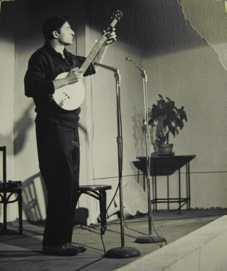
Fleming Brown, born in Marshall, Missouri, United States, was an American banjo player and one of the early teachers at Chicago's Old Town School of Folk Music. As an artist, Brown specialized in traditional songs of the Southern Appalachians. He was influenced by old-time banjo players such as Uncle Dave Macon and Dock Boggs. Brown supported himself as a graphic artist and as such never performed widely outside of Chicago.

Frank Hamilton is an American folk musician, collector of folk songs, and educator. He co-founded the Old Town School of Folk Music in Chicago, Illinois in 1957. As a performer, he has recorded for several labels, including Folkways Records. He was a member of the folk group The Weavers in the early 1960s, and appeared at the first Newport Folk Festival in 1959. He was the house musician – playing guitar and other folk instruments – for Chicago's Gate of Horn, the nation's first folk music nightclub. After many years of teaching, playing, and singing in California he married a third time, and with his wife relocated to Atlanta, where he performs on banjo, guitar, ukulele, voice, and other instruments and co-founded the Frank Hamilton School in 2015.
Ola Belle Reed was an American Appalachian folk singer, songwriter and banjo player.
Dillard Chandler was an American Appalachian Folk singer from Madison County, North Carolina. His a cappella performances on compilation albums were recorded by folklorist and musicologist John Cohen.
"Cumberland Gap" is an Appalachian folk song that likely dates to the latter half of the 19th century and was first recorded in 1924. The song is typically played on banjo or fiddle, and well-known versions of the song include instrumental versions as well as versions with lyrics. A version of the song appeared in the 1934 book, American Ballads and Folk Songs, by folk song collector John Lomax. Woody Guthrie recorded a version of the song at his Folkways sessions in the mid-1940s, and the song saw a resurgence in popularity with the rise of bluegrass and the American folk music revival in the 1950s. In 1957, the British musician Lonnie Donegan had a No. 1 UK hit with a skiffle version of "Cumberland Gap".
Terence Patrick Winch is an Irish-American poet, writer, and musician.
Roger Sprung was an American banjo player and teacher best known for introducing authentic bluegrass banjo picking styles to the folk music community in the north and for the eclectic manner in which he adapted bluegrass banjo techniques to music of other genres. His 1963 album Progressive Bluegrass may have been the first use of that title, later applied to a subgenre of bluegrass music by him and others.
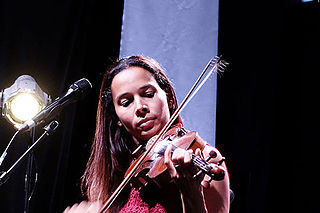
Rhiannon Giddens is an American musician known for her eclectic folk music. She is a founding member of the country, blues, and old-time music band the Carolina Chocolate Drops, where she was the lead singer, fiddle player, and banjo player.
Dudley Dale Connell is an American singer in the bluegrass tradition. He is best known for his work with the Johnson Mountain Boys, Longview, and The Seldom Scene.
Jeff Place is the Grammy Award-winning writer and producer and a curator and senior archivist with the Smithsonian Center for Folklife and Cultural Heritage. He has won three Grammy Awards and six Indie Awards.
References
- Altman, Ross. "Pure Perfection": Across the Amerikee: Showpieces from Coal Camp to Cattle Trail. [14]
- Harrington, Richard. “Stephen Wade, Trusting in an Unsung Hero.” Washington Post, Oct. 13, 2006.
- Hentoff, Nat. "American Folk Songs, Direct From the Field," Wall Street Journal, Nov. 20, 1997.
- Guarino, Mark. "Stephen Wade Uncovers 'The Beautiful Music All Around Us'," Christian Science Monitor, Sept. 20, 2013.
- Inskeep, Steve. "Stephen Wade and the Banjo." Morning Edition, National Public Radio, Sept. 19, 2003.
- Kalem, T. E. "Pipes of Pan." Time, June 25, 1979.
- Kogan, Rick. "Stephen Wade: A Telling Tale of Making Beautiful Music." Chicago Tribune, April 5, 2013.
- McClain, Buzz. “Stephen Wade, Back to Teach.” Washington Post, Oct. 16, 2006.
- Moss, Mark D. "Stephen Wade." Sing Out! 42, no. 4 (Spring 1998): 76–77.
- "Stephen Wade." Folkstreams. [15]
- Wolfe, Charles K. "The Early Years." In The Blackwell Guide to Recorded Country Music, edited by Bob Allen, 37. Oxford: Blackwell, 1984.